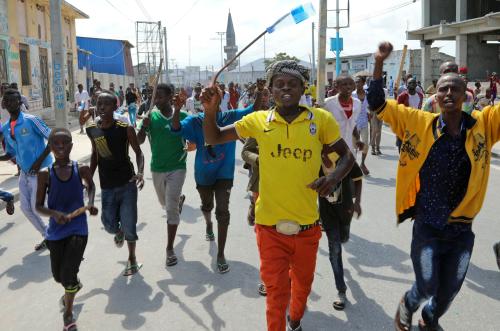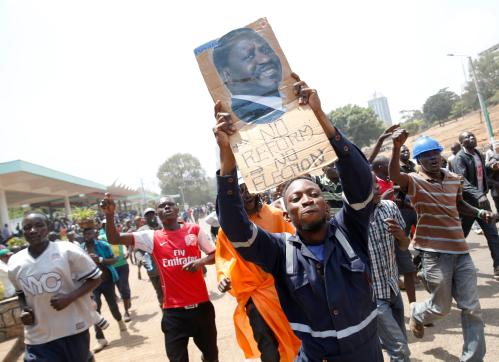Botswana’s President Khama Vies for Reelection
Today, Friday, October 24, Botswana holds presidential and parliamentary elections, which, according to numerous political analysts, are expected to reinforce power for incumbent President Ian Khama and his Botswana Democratic Party (BDP). President Khama faces two main opposition parties at the polls, including the Umbrella for Democratic Change (UDC)—a coalition of three opposition parties formed in 2012 and headed by human rights lawyer, Duma Boko—and the Botswana Congress Party (BCP)—led by self-identified reformist and major critic of the Khama administration, Dumelang Saleshando. Of the 57 parliamentary seats up for election, the ruling BDP currently holds 41 while the UDC and the BCP each hold 8. Although the BDP maintains a considerable majority in parliament, the Mail & Guardian suggests that the distribution of seats among the parties may alter significantly to reflect growing public discontentment with the BDP and the persistently high levels of unemployment and economic inequality that have endured throughout the party’s time in power.
In the months leading up to the elections, the people of Botswana have become increasingly unsettled by reports that the BDP has violently suppressed some of its political opponents—including members of the opposition and the media—through harassment by the Directorate of Intelligence and Security (DIS), a security body that reports to President Khama. Political tensions between the BDP and UDC have escalated since the UDC claimed that the security body may have played a role in manufacturing a car accident that resulted in the death of former UDC Deputy President Gomolemo Motswaledi in July. Khama and the BDP have dismissed these allegations and continue to cite Botswana’s top performance on internationally respected rankings on governance (including the Ibrahim and Transparency International indexes) as evidence of its stable, democratic performance. Critics, however, have argued that these glowing reviews are outdated, disconnected and unrepresentative of the current political realities in Botswana.
Global African Investment Summit Garners Attention to New Projects in Africa
On Monday and Tuesday, the Global African Investment Summit brought together over 300 international business leaders and government officials from across the African continent to discuss opportunities for private sector engagement and investment in Africa. Throughout the two-day meeting, public and private sector project owners presented 136 projects to international investors, representing approximately $246 billion in capital. Heads of state, including Rwandan President Paul Kagame, Ugandan President Yoweri Museveni, Ghanaian President John Dramani Mahama and Tanzanian Prime Minister Mizengo Pinda opened the meeting with a presidential panel. They highlighted the strategic advantages of investing in Africa, including high returns, ample consuming power and market access, and the variety of strategic sectors poised for growth but where investment is needed. In particular, they noted infrastructure, energy, agriculture, transport and tourism as vital sectors. President Museveni, however, argued against investments in the Ugandan energy sector unless investors were willing to propose cost-effective plans that reduce electricity fees for consumers, since electricity fees associated with privately owned energy projects are currently higher than those associated with government-funded projects. The summit chair and Nigeria’s former president, Olusegun Obasanjo, also called on investors to consider ways of supporting inclusive growth through their investments, stating that, as African leaders, “we expect our partners to place the social and economic development of our citizens at the forefront of their projects’ design.”
Cease-fire with Boko Haram in Nigeria in Doubt as Violence Continues
Despite the Nigerian government’s assertion that Boko Haram agreed to a cease-fire last Friday and that it would soon release the schoolgirls kidnapped from Chibok in April, at least 25 more girls in Northeastern Nigeria were kidnapped by the militant group late Wednesday night. A bomb planted by suspected Boko Haram fighters at a bus station in Bauchi state also exploded on Wednesday, killing five people and wounding a dozen more.
The continuation of violence and perceived secrecy surrounding the government’s peace deal has led some observers to question its claims that the insurgency has finally ended. However, members of the Chadian government who have been mediating the talks with Boko Haram stated on Friday that the truce was still on, in spite of the violations by Boko Haram members—possibly committed by “dissidents that even [Boko Haram] aren’t able to control”—and would proceed with the liberation of the schoolgirls, although they did not elaborate on a clear timeline of this process.



Commentary
Africa in the News: Botswana Votes; Global African Investment Summit Held in London; Boko Haram Cease-fire Appears to Fold
October 24, 2014